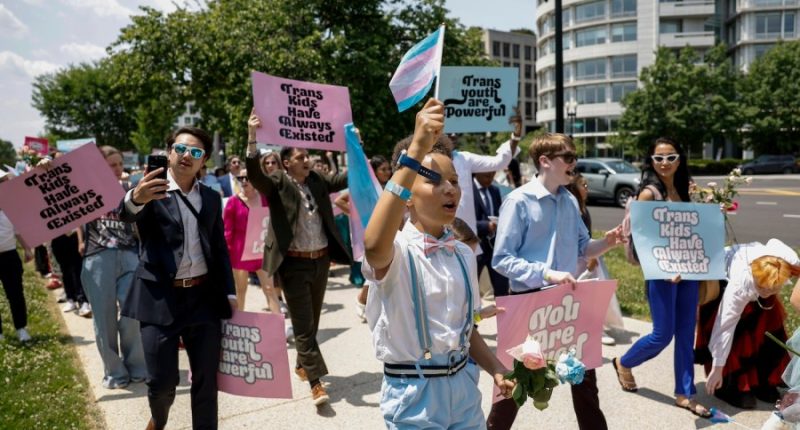Share this @internewscast.com

The Supreme Court announced on Thursday that it will review whether states have the authority to prohibit transgender athletes from joining girls’ and women’s school sports teams.
The court agreed to consider appeals from Republican officials in Idaho and West Virginia who are advocating for their state-level bans. A ruling is anticipated by the following summer.
This development initiates another significant debate on transgender rights before the predominantly conservative court, which has recently supported Tennessee’s ban on gender-affirming healthcare for minors.
In the wake of that decision, the justices on Monday sent back to lower courts disputes involving Idaho’s Medicaid prohibition on transition-related surgeries, North Carolina’s similar ban in its state-sponsored health plan and Oklahoma’s refusal to change the listed sex on transgender people’s birth certificates.
But the Supreme Court held onto the transgender athlete cases that had piled up on their docket, weighing requests from Idaho and West Virginia’s Republican attorneys general to get involved now.
“It’s a great day, as female athletes in West Virginia will have their voices heard,” Attorney General JB McCuskey said Thursday.
“We are confident the Supreme Court will uphold the Save Women’s Sports Act because it complies with the U.S. Constitution and complies with Title IX. And most importantly: it protects women and girls by ensuring the playing field is safe and fair,” he added.
The justices’ decision next term stands to impact a wave of laws restricting transgender athletes’ participation in 27 states. In 2020, Idaho became the first state in the nation to ban trans students from competing on teams that match their gender identity.
In February, President Trump signed an executive order opposing transgender women and girls’ participation in female sports.
“Female athletes are losing medals, podium spots, public recognition, and opportunities to compete due to males who insist on participating in women’s sports,” Idaho wrote in its petition. “So much of what women and girls have achieved for themselves over the course of several decades is being stolen from them—all under the guise of ‘equality.’”
The laws have sparked an array of legal challenges that argue they violate the 14th Amendment’s Equal Protection Clause and Title IX, the federal law against sex discrimination in schools.
Many of the challenges are spearheaded by the American Civil Liberties Union (ACLU), which represents the plaintiffs in both Idaho and West Virginia.
“Like any other educational program, school athletic programs should be accessible for everyone regardless of their sex or transgender status. Trans kids play sports for the same reasons their peers do — to learn perseverance, dedication, teamwork, and to simply have fun with their friends,” said Joshua Block, senior counsel for the ACLU’s LGBTQ & HIV Project. “Categorically excluding kids from school sports just because they are transgender will only make our schools less safe and more hurtful places for all youth. We believe the lower courts were right to block these discriminatory laws, and we will continue to defend the freedom of all kids to play.”
In Idaho, the civil rights group represents Lindsey Hecox, a transgender runner who wanted to compete on Boise State University’s women’s track and cross-country teams. Lower court rulings allowed Hecox to try out for the teams, leading to Idaho’s latest appeal.
“Petitioners seek to create a false sense of national emergency when nothing of the sort is presented by this case. This case is about a four-year old injunction against the application of H.B. 500 with respect to one woman, which is allowing her to participate in club running and club soccer in her final year of college,” Hecox’s legal team wrote in court filings last year.
The ACLU similarly urged the court to turn away the appeal in West Virginia, where a lower court blocked the state from enforcing its ban against Becky Pepper-Jackson, a high school student who throws discus and shot put for her school’s girls’ track-and-field team.
When Pepper-Jackson first sued the state over its restrictions on transgender athletes, she was 11 years old and in middle school.
Both Idaho and West Virginia’s attorneys general brought on Alliance Defending Freedom, a conservative Christian legal powerhouse, to defend their bans.
—Updated at 9:54 a.m. EDT













